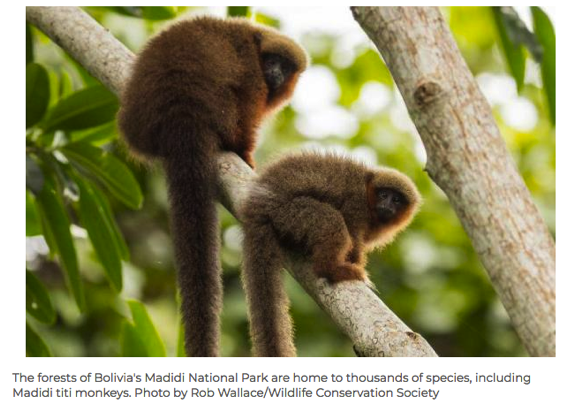
Bolivia's Madidi National Park is most biodiverse in the world
May 22, 2018 - UPI
Researchers hope the publicity earned by Madidi's record-setting biodiversity will encourage a continued commitment to conservation.
By Brooks Hays
May 22 (UPI) -- Bolivia's Madidi National Park is the world's most biodiverse protected area, according to a newly completed two-year survey of the park's plant and animal inhabitants dubbed "Identidad Madidi."
While documenting the park's thousands of plant and animal species, researchers identified 120 new candidate species of plants, butterflies and vertebrates.
"We have accomplished everything we hoped for and more on this journey of science and discovery," Robert Wallace, a scientist with the Wildlife Conservation Society who lead the recent survey, said in a news release. "The massive amounts of images and data collected on the expedition will provide us with the baseline information needed to protect this natural wonder for future generations of Bolivians and the world."
The park features dramatic elevation changes as the Amazon transitions to the Andes, and as a result, it hosts a wide range of ecosystems, including grasslands, rivers, streams, wetlands and several types of forests -- Amazonian forests, montane dry forests, treeline elfin forests, Andean foothill forests and cloud forests.
Bolivian scientists and international collaborators visited all over the park's ecosystems, conducting field work at 15 research sites. Their efforts revealed the presence of 1,382 species and subspecies not previously known to live in the park.
The documented newcomers included: 100 mammals, 41 birds, 27 reptiles, 25 amphibians, 138 fish, 611 butterflies and 440 plants. The park is now documented as hosting 265 mammals, 1,028 birds, 105 reptiles, 109 amphibians, 314 fish, 5,515 plants and 1,544 butterfly species, making it the most biodiverse terrestrial protected area in the world.
Researchers hope the publicity earned by Madidi's record-setting biodiversity will encourage a continued commitment to conservation.
"The comments from both social media followers and schoolchildren suggest Bolivia is falling in love with Madidi," said Lilian Painter, program director with WCS Bolivia. "Instilling a love of biodiversity in the leaders of tomorrow is perhaps one of the most important legacies of Identidad Madidi."
Though Madidi -- teeming with jaguars, pumas, dolphins and monkeys -- is undoubtedly a success story, it is unfortunately an increasingly rare success story. Recent studies suggest protected areas are increasingly degraded by human activities.